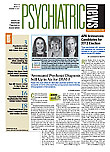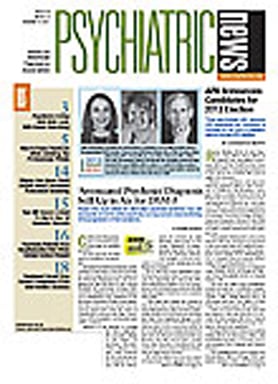The Centers for Medicare and Medicaid Services (CMS) announced on October 14 the addition of annual depression and alcohol screenings to Medicare's existing package of preventive services. Several of APA's recommendations were incorporated into the final language of the new benefits.
"Coverage of these screenings is a victory for the Medicare beneficiary population as much as for APA," said Julie Clements, deputy director for regulatory affairs in APA's Department of Government Relations.
In commending CMS for the decision to expand its coverage, APA also reiterated some of its key recommendations included in an earlier letter to the agency (Psychiatric News, October 7). Specifically, APA strongly urged those primary care providers administering depression or alcohol misuse screenings to consult with a psychiatrist when a Medicare beneficiary screens positive, as well as to provide these patients with referrals for further psychiatric treatment.
Under CMS's new coverage policies, depression screenings are now available in primary care settings that have "staff-assisted depression care supports" in place to ensure accurate diagnosis, effective treatment, and follow-up. CMS defined these supports as consisting of, at a minimum, clinical staff who can advise the primary care physician or practitioner of screenings results and who can facilitate and coordinate referrals to mental health treatment.
The new alcohol misuse benefit will also cover up to four brief, in-person behavioral counseling sessions a year for those beneficiaries who screen positive. Beneficiaries eligible for counseling are defined by CMS as those who misuse alcohol, but whose levels or patterns of alcohol consumption do not meet criteria for alcohol dependence and who are competent and alert at the time that counseling is provided.
Additionally, CMS specified that each of the counseling sessions must be consistent with the "Five A's" approach adopted by the U.S. Preventive Services Task Force:
Assess: Ask about and evaluate behavioral health risks and factors affecting the choice of goals and methods for changing behavior.
Advise: Provide clear, specific, and personalized advice on changing behavior, including information about how changes may affect personal health.
Agree: Collaboratively select appropriate treatment goals and methods based on the patient's interest in and willingness to change behavior.
Assist: Through self-help and/or counseling, supplemented by medication when necessary, aid the patient in acquiring the skills, confidence, and social supports to help change behavior.
Arrange: Schedule follow-up consultations to provide ongoing support and to adjust the treatment plan as needed, including referral to specialized treatment.
CMS also noted that emergency departments, inpatient hospital settings, ambulatory surgical centers, independent diagnostic testing facilities, skilled nursing facilities, inpatient rehabilitation facilities, and hospice are not considered primary care settings for either of these newly approved benefits.
More information on CMS's coverage decision on depression screening and alcohol misuse screening is posted at < www.cms.gov/apps/media/press/release.asp?Counter=4119>. APA's comments on the screenings are posted at < www.psych.org/MainMenu/AdvocacyGovernmentRelations/GovernmentRelations/RegulatoryComments/Depression-Alcohol-Misuse-Comments.aspx?FT=.pdf>. 

